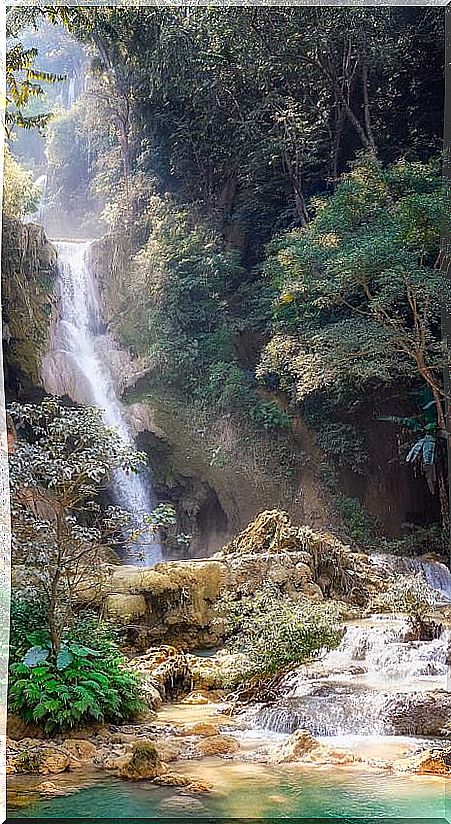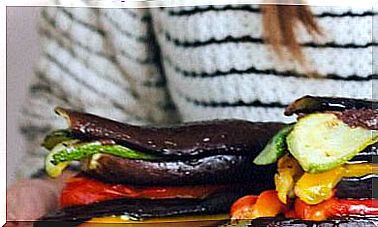Paradise Is Near: How To Get To See It?
What is paradise like? Philosophy, religion and even utopias have been describing it since the beginning of humanity. What if it were within our reach?

The word “paradise” comes from the Greek paradeisos and refers to the image of a large garden where human beings live in harmony with their environment. Indeed, we cannot imagine a heavenly place without the presence of plants and trees, nor of birds.
If we separate ourselves from nature, we do so from ourselves, endangering the ecological and personal balance. That is why we need to periodically return to landscapes –beaches, meadows or forests– that give us to a certain extent the feeling of returning to paradise.
We come into the world with the longing for something that we lack, that perhaps we had or that the mysterious destiny will bring us in the future. Some call this inner restlessness “nostalgia for paradise.”
So close your eyes and imagine a happy place where you would like to live … Surely, without you noticing, a smile will begin to appear on your face. That means that even though you wouldn’t say it out loud, you also believe in the possibility of paradise.
We all want to be happy. Often without knowing how to achieve it, learning from mistakes, jumping obstacles, fighting for loved ones. It is difficult to measure the success or failure of this endeavor that seems endless to us.
What is paradise like?
Many philosophies and religions come to say the same thing with similar or different words. For this reason, talking about paradise does not seem like something strange to us.
A place of peace and harmony, where everything has a special shine and needs – if any – are easy to meet. There is no conflict or wars there, nor is it necessary to work hard to get shelter or food, because nature itself offers it to us.
If Eden exists, surely in it what unites us to other beings eclipses what separates us. There is less self-centeredness and we feel serene joy. How to find it?
In the book of Genesis the creation of Adam and Eve is symbolically related , and their peaceful life in the Garden of Eden in harmony with the animals. The earthly Paradise had at its center the Tree of Life, from which flowed four rivers that fertilized the four directions of space. Due, according to the biblical account, to a sin of pride, God is forced to expel them from there.
This passage from the center to the existential periphery, from eternity to temporality, is explained in the detail that they are for the first time aware of their nakedness (the ethereal or luminous body becomes another more dense or material). From that moment on, nature becomes hostile to them, Eva will give birth in pain, you have to work to earn a living and, ultimately, the gates of paradise are closed.
All the spiritual traditions of humanity refer to a similar situation, the loss of a harmonic primordial state, which can nevertheless be recovered, although not without great effort.
The philosopher Plato affirmed that before descending to the material plane our soul dwelt in the ideal world of pure or archetypal forms. In terrestrial life we only recognize what we already know, be it the geometric figure of the triangle, a tree or the importance of love. It would also be possible for that soul, now captive or limited, to return to its original homeland through a spiritual process of recognition (anamnesis) of its own immortal nature.
In the texts of the ancient wisdom of the Indian Vedas it is stated that the universe is governed by three forces or qualities, called gunas , which explain the movements of both external nature and our psyche:
- Sattva (S) : clarity, purity, intelligence, goodness, harmony. “Upward” movement.
- Rajas (R) : energy, activity, change. Expansive “horizontal” movement.
- Tamas (T) : darkness, inertia, ignorance, materiality. “Downward” movement.
This qualitative classification can be used to understand the functioning of our body (the three doshas of Ayurvedic medicine) or the differences in plants and animals. In our own constitution these three qualities are appreciated: spirit (S), soul (R) and body (T).
We are not angelic beings, we need material support to exist. But without forgetting that our essence is of a sattvic or luminous nature, like that of paradise.
Thus we see that, within the birds, the birds are generally sattvic (innocent, happy appearance, their songs), the eagle is a rajasic bird of prey and the tamasic vulture because of its appearance and scavenging activity. Although this classification is not absolute : the eagle becomes a spiritual symbol when it flies majestically towards the sun and the vulture always retains its dignity of being alive.
Heaven or hell?
The ancient Egyptians believed that the soul of the deceased was weighed on a scale by the god Osiris and that, ideally, it should be lighter than a feather. It is understandable that a sattvic soul ascends to a better place, while a tamasic one goes down (remember that the word hell is related to “lower” or underground ).
Due to the movement of each guna, it does not occur to anyone, for example, to pray looking down but up. The human being, eminently rajasic or passionate, is situated between heaven and earth. That is why it can ascend or descend – as the humanist Pico della Mirandola would say – on the ladder of creation, being endowed with intelligence and freedom of action.
Religions affirm that after death the soul can go to a bright and happy place (Heaven), or a dark and suffering place (Hell). This is not without its logic, it would be unfair if the fate of a murderer was better than that of one who tried to help his fellow men.
Heavenly paradises are not exclusive to Christianity; Celtic and Nordic peoples had theirs, as did Judaism or Islam. Also Taoism (“Islands of the immortals”), Hinduism (Brahmaloka) and Buddhism with their “Pure Lands”, in which a paradisiac circle or mandala is generated around a Buddha.
A form of Buddhism, Amidism, is widespread throughout Asia and is based on the belief that Amida promised rebirth in his paradise (Dewachen) to those who have faith and recite his mantra (Om Ami Dewa Hri).
Someone may rightly think that it is not certain that all of this is true. They asked the philosopher Pascal if he believed in Heaven, to which he replied that it was practical to do so, because in the event that it was not true, nothing would be lost by trying to be a good person ; and if it was true, it would not have been in vain.
What if paradise was just a new look?
William Blake maintained that in reality Adam and Eve had not been expelled from Paradise, but that their vision had been darkened and where there was splendor they only saw wasteland. Their senses were limited and they stopped understanding the language of animals and the harmonious messages of plants. But Eden continues to be present for whoever is able to glimpse it.
In any place, time can stop for an instant and things take on a new meaning. There is then a change in the look, a metanoia.
Although paradise can be considered a place, it would be more accurate to speak of a state of consciousness. And although its fullness may not be within our reach due to the veils (karmic obscurations) that we ourselves have been creating, that does not mean that it is far away and without any connection with our present situation.
The attempt to collectively create a paradise on earth through politics has had examples in recent history – communism, Nazism, and the current savage capitalism – not just of failure but of human suffering. The explanation is simple, as Lanza del Vasto used to say: “revolution without conversion is like a hole in water.” The human being, driven by his egocentricity, cannot create a system that is generous with the common good in a dictatorial way.
For its part, the use of alcohol and various drugs that lead to “artificial paradises” does not seem like a good way either. It all depends on the intention and personal capabilities of those who use these substances, as well as the amount and frequency. The wine, which gladdens the heart drunk at a party, can lead to hell if abused him. The natural drugs that once were used in circles of initiates, as shamanic journeying or as an instrument of knowledge, have nothing to do with dangerous drugs laboratory taken as fun.
The themes capable of returning us to a certain extent to an almost paradisiacal state can be summarized in three: love, which unites us to others; the beauty, reminding us of the harmony; the mood that brightens our lives. They all relieve us of the heaviness of the ego and bring us closer to our essence. That is why a person in love feels that the world is lighter, friendlier and brighter.
According to a Sufi saying, children still come into the world with the perfume of paradise. Babies captivate us with their innocence. For their part, elderly people are also chronologically closer to the spiritual.
I remember the experience of visiting a place for Tibetan refugees in Ladakh (India). The elders were sitting on mats and most reciting with their rosaries the mantra ( Om mani padme hum ) of Chenrezig, the Buddha of Compassion. It was touching to see them so worthy despite being old and sick. I imagined asking them what they were doing, but the answer was obvious: “We are waiting for the next flight to paradise.”
There are glimpses of paradise in our lives, but we don’t always realize it in that moment. Although sometimes we understand it over time, as with childhood experiences. Nor is it easy, in the midst of everyday problems, to have the right attitude.
That is why the Persian poet and mathematician Omar Khayam wrote these words: ” When you waver under the weight of pain, when there are no more tears, think of the greenery that shines after the rain. When the splendor of the day exasperates you, when you wish that a definitive night falls on the world, think of the awakening of a child. “
Build your own heavenly moments
Sometimes we experience sensations that we can well call paradisiacal. They are characterized by awakening in us feelings of peace and inner joy. Also of unconscious gratitude towards life and even of momentary fulfillment. The happiness of a mother hugging her baby or the intimate encounter between two people who really love each other cannot be expressed.
Here are some examples related to the five senses:
View
Appreciating beauty, wherever it is shown, brings us closer to the spiritual world. The nature is the most splendid framework in this regard. Also the visual arts – painting, sculpture, architecture – can be an expression of beauty.
Hearing
The music has always accompanied the human being. Listening to it relieves us of tension and often comforts us. In a special way, certain melodies from the folklore of various peoples evoke the nostalgia for paradise and manage to move us.
Smell
Smells and perfumes go to the most instinctive, without going through rationality. We are easily transported to invisible worlds full of charm. That is why they are used in temple ceremonies, especially in the East. It is the subtle soul of plants. Who can resist the magic of sandalwood, rose or jasmine …
Taste
Eating tasty food is a rewarding experience, although the danger of gluttony exists. It is not by chance that the sweet taste is the first to be appreciated by children and the last to be lost in the elderly.
Touch
The caresses make us close our eyes, taking us to unknown and pleasant places. Its erotic potential is well known, but we want to highlight here the simple act of caressing hands or a face as a sign of love and understanding. As poets and scientists know, the skin – apparently outer – is our deepest part.









